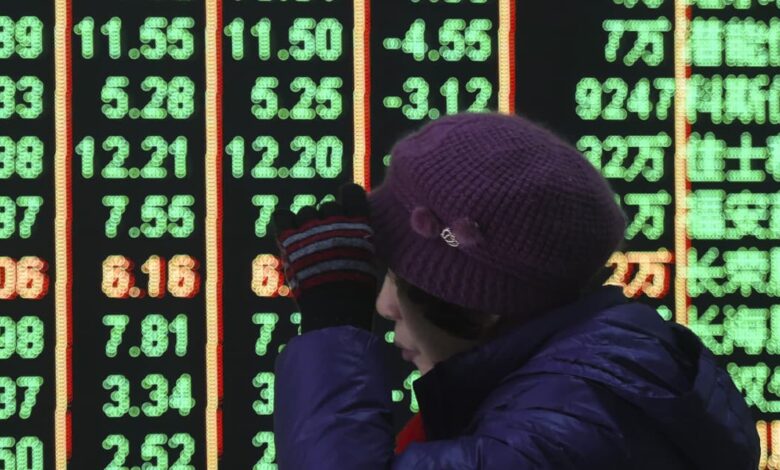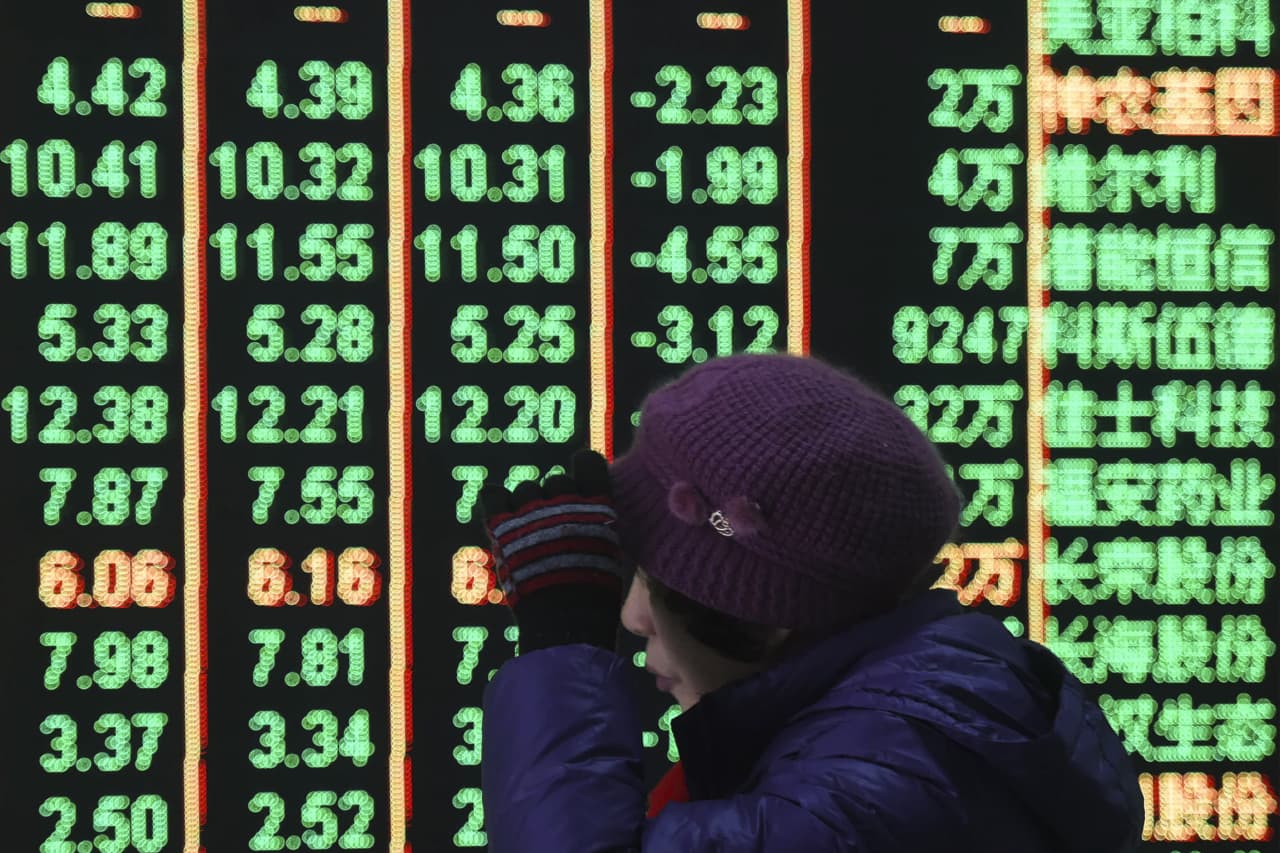Opinion: Nervous about the U.S. market at all-time highs? Buy China stocks.

Wary of U.S. stocks because you think the valuations look rich? China stocks are a solution. If you’re reluctant to buy, given all the negative headlines about China, counterintuitively that’s part of the reason to buy. Sentiment towards Chinese stocks is so negative, it’s a decent contrarian indicator telling us this is the time to get exposure.
Valuations support the case. The FTSE China A50 Index
XX:XIN9X000
and China’s CSI 300 Index
XX:000300
are trading at discounted valuations not seen in years, says Jason Hsu, the chief investment officer of Rayliant Global Advisors, which runs the Rayliant Quantamental China Equity
RAYC
exchange-traded fund.. Those indices recently traded a bit below 10 times trailing earnings, not much above the low of eight times seen in 2015.
Sure, there are a lot of negatives. Global trade wars, worries that Chinese might use its military to occupy Taiwan, and a slowdown in the Chinese economy, to name a few. But by now, the fears are more than priced into the Chinese market, Hsu says.
Besides, a lot could go right from here. Here’s a look at what could change and help the Chinese economy and investor sentiment towards China, along with several Chinese companies to consider.
What could go right
Big picture, China’s president Xi Jinping is paying attention to economic growth in a significant way, with several bullish implications. “We are seeing Xi Jinping moving away from a fixation about China’s position on the global stage, back to the economy,” Hsu says. For example, Xi has made it clear both at home and abroad that the use of military force to reunite with Taiwan is not on his agenda.
This shift has three big potential implications for investors:
1. China may unleash fiscal stimulus: A loose monetary policy hasn’t helped enough since loan demand remains low. This is why we could see fiscal stimulus announced at an important policy meeting taking place in China the week of March 4, says Sharukh Malik, a portfolio manager on the Asian & Emerging Market equities team at Guinness Global Investors.
Watch for news out of the Two Sessions Forum happening this week alongside the National People’s Congress annual meeting. “If there is new stimulus, that is when it will be announced,” Malik says.
2. China is directing capital to key growth sectors: To boost growth now that the property investment machine has stopped generating wealth (more on this below), China is directing capital to key sectors such as electric vehicles and the supporting supply chain (batteries, natural resource extraction), industrial automation and chip manufacturing, says Malik.
Consider that recent smartphones released by China’s Huawei contain sophisticated 7-nanometer chips made by China’s Semiconductor Manufacturing International
981,
according to TechInsights, a chip- sector research outfit. These sectors probably won’t become large enough to offset the property sector decline until 2026-28, Malik says. But early signs that these investments are working will improve investor sentiment.
3. The Chinese government is buying stocks on weakness: Earlier this year China’s government announced it is purchasing stocks to support the equity market. There are also new restrictions on short selling. “The government has been aggressively buying large-cap stocks,” Hsu says. Substantial selling “triggers buying and the stock index gets back above water,” he says. Hsu also notes that the government is leaning on banks to convince high-net-worth clients to move into stocks from deposits.
Property fears overblown?
A big fear about China is that over-levered property owners will miss loan payments, creating a systemic crisis. But these fears may be exaggerated for a couple of reasons. One is that since 2020 the government has been reducing the amount of debt property managers can hold. Next, China’s banking system has been building capital reserves over the past 10 years, Malik says. “The financial system as a whole system can absorb losses at Chinese property developers,” he adds. Some smaller banks and shadow lending institutions may run into trouble, but their loan books are relatively small.
Plus, homeowners are not over-levered the way they were in the U.S. going into the 2008 global financial crisis. Required down payments on first homes are high, around 30%, and second homes have to be bought with cash, says Hsu.
Stocks to consider
Investment researcher Morningstar is on board with the “buy China” theme. Morningstar is a value shop, so it notices the discounts. It has five-star ratings (out of five) on the search company Baidu
BIDU,
JD.com
JD,
and Tencent Holdings
TCEHY,
in mobile gaming. Here’s a quick look:
Baidu: Kai Wang, who covers Baidu at Morningstar, says the company’s advertising business accounts for around three- fourths of sales. This makes it a cyclical business — the kind that will benefit if economic growth improves. Baidu faces competition in advertising from TikTok, but it is moving into cloud services and artificial intelligence, which could offset the challenge.
JD.com: This online retailer is trying to boost profits by cutting low-margin products from its direct sales and encouraging third-party sellers to offer them, says Chelsey Tam, who covers the company for Morningstar. At the same time, JD.com is cutting prices to improve its image as an “everyday low-price” platform. It may also get a lift from using AI to help customers.
Tencent Holdings: Tencent owns some of the most popular titles in mobile gaming, including Honor of Kings and PUBG Mobile. More than 40% of operating income comes from this segment, says Morningstar analyst Ivan Su. Tencent will continue to leverage user data and financial strength to create popular mobile games, he predicts.
Beyond games, Tencent owns the messaging apps WeChat and QQ, as well as WePay, music streaming, and cloud services offerings. Su sees a “tremendous amount of untapped value” in WeChat as advertisers and service companies in payments, delivery, and insurance look to access its 1.3 billion users.
NetEase: Malik, at Guinness Global Investors, singles out NetEase
NTES,
The second-largest mobile game company in China, NetEase owns the country’s most popular multiplayer title: Fantasy Westward Journey. It also owns popular titles such as Onmyōji, Knives Out and Identity V. It’s been buying studios abroad, and partnering with Microsoft, Activision Blizzard and Walt Disney’s Marvel to release games based on popular titles including Harry Potter and Lord of the Rings. NetEase is also in music streaming, online education and e-commerce.
Cyclical stocks
A lot of brokerage accounts don’t let you buy the shares of Chinese companies on local exchanges or in Hong Kong. Yet this is where the action will be if the Chinese economy turns around. Hsu’s ETF looks interesting because it invests mainly in local-market listings and has a cyclical tilt. The Rayliant Quantamental China Equity ETF is overweight cyclical areas including basic materials, financial services, industrials and technology.
The fund, for example, has big positions in a consumer electronics company called Midea Group
000333,
and Foxconn Industrial Internet
601138,
which makes electronics components used in tech products. The portfolio also includes Kweichow Moutai
600519,
which sells premium liquor.
Michael Brush is a columnist for MarketWatch. At the time of publication, he owned JD and MSFT. Brush has suggested JD, MSFT and DIS in his stock newsletter, Brush Up on Stocks. Follow him on X @mbrushstocks.
More: Economy in spotlight as China’s big political meeting of the year gets underway
Also read: China says news conference with premier is cancelled
Source link





